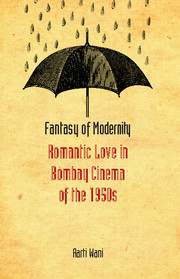2 - The Song of Love
Published online by Cambridge University Press: 05 March 2016
Summary
The song, the most definitive feature of Hindi films, has only recently moved into the orbit of critical discourse. Studies have focused on the two distinct but interlinked lives of the film song. One involves the processes of the song's conception, production and participation in the making of cinematic meaning as it employs the combined labour of lyricist, musicians, actors, set designers, cameramen and directors (Morcom, 2007; Booth, 2008). The second looks at its reception and dispersal via multiple technologies and across diverse geographical spaces (Larkin, 1997; Gopal and Moorti, 2008). These twin approaches have instantiated the unpacking of one of the most vital sites of Hindi cinematic culture to allow the question – what kind of an object is the film song? Hoping to contribute to this discourse but with a specific lens on the 1950s, I seek to explore the role of film songs in the making of the modern sensibility of romantic love. Traversing through a variety of songs and their contexts; duets and solos, joyous and sad, comical and despairing from 1950s films, I delve on the song sequence as an event that erupts in an audiovisual spectacle of lyrics, music, performance and mise-en-scène to produce intense experiences of selfhood and self-fashioning through love.
Lalitha Gopalan (2002, p. 19) has alerted us to the role of song and dance sequences in Indian cinema; even when integral to the plot by ‘interrupting’ the narrative they facilitate the purpose of delay and distraction of its linear development. On the other hand, Ravi Vasudevan (1989, p. 31) terms songs along with dance and comic sequences, paranarrative units that ‘work to create parallel pleasures and perhaps to problematize the work of the narrative’. Drawing on conventions of excess, in terms of emotionally charged lyrics and music, mise-en-scène and performative registers, songs can become a locus of that which cannot be contained by the narrative. If Vasudevan's and Gopalan's are valuable insights into the role, place and workings of the song phenomenon of Hindi films, it also is, additionally, in tandem with the notion of the heterogeneous form of Hindi films where songs are seen to have an independent production, circulation and reception of its own. In relation to the 1950s though, the argument needs to be nuanced to take into account the singular realities of the period's film form.
- Type
- Chapter
- Information
- Fantasy of ModernityRomantic Love in Bombay Cinema of the 1950s, pp. 80 - 132Publisher: Cambridge University PressPrint publication year: 2016



